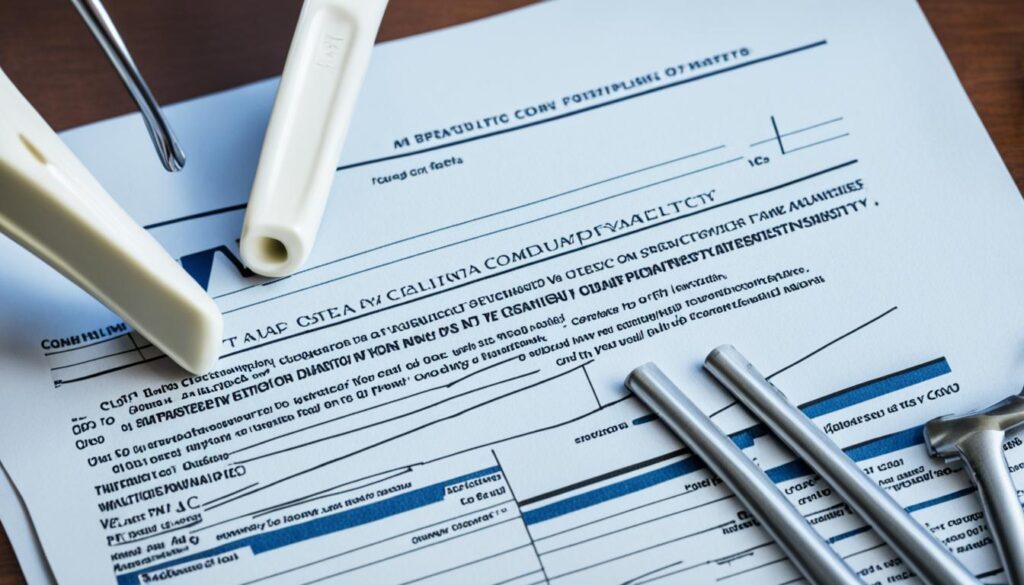Did you know that VA disability benefits can be garnished to fulfill alimony payments for veterans who are divorced? This unexpected reality may not be common knowledge among many veterans. The legal position on VA disability garnishment for spousal support was clarified by the Federal Circuit’s decision in Rhone v. McDonough. Veterans who opt to convert a portion of their military retirement pay into disability compensation should be aware that the VA can withhold from their disability benefits for alimony and child support. The exact amount of garnishment varies, depending on factors such as the number of dependents the veteran is supporting.
Key Takeaways:
- VA disability compensation can be garnished to fulfill alimony obligations for veterans who have divorced.
- If a veteran has waived a portion of their military retirement pay to receive disability compensation, the VA can withhold disability compensation for alimony and child support payments.
- The amount that can be garnished depends on factors such as the number of dependents the veteran has.
Can VA Disability Compensation Be Used to Satisfy Alimony?
In the case of Rhone v. McDonough, the Federal Circuit addressed the issue of whether VA disability compensation can be used to satisfy alimony obligations. The court ruled that if a veteran has waived a portion of their military retirement pay to receive disability compensation, the VA can withhold disability compensation for alimony payments. This is authorized by 42 U.S.C. §659(a) and (h)(1)(A)(ii)(V). The amount that can be garnished will vary based on specific factors, such as the number of dependents the veteran has.
It is essential to note that Rhone v. McDonough clarified the legality of using VA disability compensation to satisfy alimony, providing clarity in cases where veterans have waived retirement pay for disability benefits. This allows state courts to order the garnishment of VA disability compensation to fulfill alimony obligations. The decision also establishes the legal basis for the VA’s authority to withhold disability compensation under such circumstances.
Example: Suppose a veteran has waived a portion of their military retirement pay in exchange for VA disability compensation. In that case, the state court can now order the VA to withhold disability compensation to satisfy alimony payments. The amount that can be garnished will vary depending on the specific circumstances, such as the number of dependents involved.

| Court Case | Issue Addressed | Ruling |
|---|---|---|
| Rhone v. McDonough | Utilization of VA disability compensation for alimony payment | VA can withhold disability compensation for alimony payments if the veteran has waived a portion of their military retirement pay |
“The court’s ruling in Rhone v. McDonough highlights the authority of state courts to order the garnishment of VA disability compensation for alimony obligations. This ensures that veterans who have waived retirement pay in exchange for disability benefits fulfill their financial responsibilities.”
The Rhone v. McDonough Case Summary
In the Rhone v. McDonough case, a veteran appealed the decision of the Court of Appeals for Veterans Claims affirming a decision of the Board of Veterans’ Appeals. The veteran had waived a portion of his military retirement pay to receive disability compensation. The court determined that the VA lawfully withheld a portion of his disability compensation payments to satisfy a state court order for alimony payments. This case, Vet. App. 20-2370, highlighted the authority of the VA, as granted by 42 U.S.C. §659(a) and (h)(1)(A)(ii)(V), to withhold disability compensation for alimony or child support payments when a veteran has waived a portion of their military retirement pay.
The Court of Appeals for Veterans Claims held that the VA had acted within its legal boundaries in withholding the disability compensation to fulfill the state court order. This decision sets a precedent for future cases involving garnishment of VA benefits for spousal support or child support obligations.
“The Court of Appeals for Veterans Claims found that the VA had the authority to withhold disability compensation for alimony or child support when a portion of the military retirement pay had been waived.”
This case emphasizes the importance of understanding the legal rights and obligations of veterans in relation to their VA disability benefits and support obligations. It also highlights the role of the Court of Appeals for Veterans Claims and the Board of Veterans’ Appeals in upholding or revising decisions regarding VA benefits.
Protection of VA Disability Benefits in Divorce
When going through a divorce, one of the concerns for disabled veterans is the potential loss of their VA disability benefits. However, there are legal provisions in place to protect these benefits and ensure they are not treated as marital property. Under the Uniformed Services Former Spouses’ Protection Act, VA disability benefits are exempt from being divided as part of a divorce settlement.
This means that disabled veterans can rest assured that their disability benefits will not be taken away or reduced due to the divorce. These benefits are intended to provide financial support and assistance to disabled veterans, and the law recognizes the importance of preserving and safeguarding them.
It’s important to note that while VA disability benefits are protected from being divided as marital property, they can still be considered when calculating child support payments. The court may take into account the veteran’s disability benefits as part of the overall financial resources when determining the appropriate amount of support.
To summarize, under the Uniformed Services Former Spouses’ Protection Act, VA disability benefits are safeguarded from being treated as marital property and divided in a divorce. This provides peace of mind to disabled veterans who may be concerned about the potential loss of their benefits during the divorce process.

Garnishment of VA Disability Benefits
Garnishment of VA benefits can occur in cases where a veteran fails to meet their spousal support or child support obligations. If a state court order is issued, the VA benefits can be garnished to ensure that the necessary payments are made. It’s important to note that this garnishment is applicable only if the veteran has waived a portion of their military retired pay to receive VA disability benefits.
The amount that can be garnished from the VA benefits will vary based on several factors. These include the veteran’s other sources of income and the needs of their former spouse and children. An assessment will be made to determine a reasonable amount that can be withheld for support payments.
Example case:
“In the case of Doe v. Smith, the state court ordered the garnishment of the veteran’s VA disability benefits to fulfill their spousal and child support obligations. The court considered the veteran’s other sources of income and the needs of the family members involved. As a result, 30% of the veteran’s VA benefits were garnished to meet the support payments.”
Garnishment of VA Benefits – Factors Considered
When determining the amount that can be garnished from VA benefits, various factors are taken into account:
- The veteran’s other sources of income
- The needs of the former spouse and children
- The overall financial situation of the veteran
- The specific state court order
By considering these factors, a reasonable and fair amount can be determined for garnishment. It is essential for the court to strike a balance that ensures support for the former spouse and children while also considering the financial circumstances of the veteran.
Garnishment Limits for VA Benefits
The percentage of VA benefits that can be garnished typically falls between 20% and 50%. This range allows for a reasonable portion of the benefits to be allocated towards spousal support and child support. A garnishment of less than 20% is generally considered insufficient to meet the support obligations, while a garnishment of more than 50% may cause undue hardship for the veteran.
Table: Maximum Percentage of Garnishment of VA Benefits
| Percentage Garnished | Garnishment Consideration |
|---|---|
| Less than 20% | Insufficient to meet support obligations |
| 20-50% | Fair allocation towards support payments |
| More than 50% | Potential undue hardship for the veteran |
Note: The actual percentage of garnishment may vary on a case-by-case basis, depending on the specific circumstances and court order.

How Much of VA Benefits Can Be Garnished?
The amount of VA benefits that can be reasonably garnished varies depending on several factors. The Department of Veterans Affairs (VA) assesses each case individually, taking into consideration the veteran’s financial situation, the needs of their dependents, and any special circumstances that may be present.
Generally, the VA allows for a reasonable garnishment of between 20% and 50% of VA benefits. However, amounts lower than 20% are considered insufficient to cover the necessary support obligations, while garnishing more than 50% is seen as causing undue financial hardship to the veteran.
When determining the specific percentage of benefits to be garnished, the VA considers the veteran’s other sources of income, such as employment earnings or retirement pensions. Additionally, the needs of the former spouse and children are taken into account, ensuring a fair allocation of support responsibilities.
It’s important to note that the VA aims to strike a balance between meeting the financial requirements of the recipient and the need to provide financial stability for the veteran. By considering these factors, the VA ensures that an appropriate amount of benefits is used to fulfill the necessary support obligations.

Circumstances Where Benefits Will Not Be Garnished
While VA benefits can be garnished for alimony or child support in certain situations, there are circumstances where garnishment is not permitted. These exemptions aim to protect veterans from undue financial hardship and consider specific details of the case. Here are the circumstances exempt from garnishment:
- Financial Hardship: Garnishment of VA benefits is not allowed if it would cause undue financial hardship for the veteran. This exemption ensures that veterans can maintain a certain standard of living and meet their essential needs.
- State Court Order: If a former spouse is living with another person and presenting themselves as married, garnishment of VA benefits is not permitted. This exemption recognizes the financial support provided by the new partner and avoids placing additional burdens on the veteran.
- Conjugal Infidelity: VA benefits cannot be garnished if the former spouse has been found guilty of conjugal infidelity. This exemption acknowledges the misconduct of the former spouse and protects the veteran from financial obligations resulting from their actions.
It’s important to note that when a child has been legally adopted, only partial garnishment may be permitted. This recognizes the responsibilities and financial contributions of both parents, ensuring a fair distribution of support.
| Exemption | Description |
|---|---|
| Financial Hardship | Garnishment is not allowed if it would cause undue financial hardship for the veteran. |
| State Court Order | Garnishment is not permitted if the former spouse is living with another person and presenting themselves as married. |
| Conjugal Infidelity | Benefits cannot be garnished if the former spouse has been found guilty of conjugal infidelity. |
| Child Adoption | If a child has been legally adopted, only partial garnishment may be permitted. |

Apportionment of VA Benefits
Apportionment plays a crucial role in ensuring that the families of veterans receive the necessary support from VA benefits. It involves assigning a portion of a veteran’s disability benefits to a family member. To initiate the apportionment process, the family member must file VA Form 21-0788, Information Regarding Apportionment of Beneficiary’s Award. This step is essential before any garnishment for spousal or child support can occur.
The VA will determine the amount of apportionment based on various factors, including the number of dependents and the financial needs of the family member. This ensures a fair and equitable distribution of benefits that aligns with the veteran’s family obligations. By implementing apportionment, the VA aims to support the financial well-being of the veteran’s family.
Apportionment of VA benefits is a legal process designed to provide valuable assistance to eligible family members, assisting them in meeting their financial needs. It offers financial stability and security during challenging times. By utilizing apportionment, the VA demonstrates its commitment to promoting the well-being of veterans and their families.

Consideration of VA Income
Even if VA benefits cannot be garnished, the court may still consider the veteran’s VA income when calculating child support or alimony. If the VA disability benefits make up a significant portion of the veteran’s total income, they may be used to fulfill support obligations. It’s important to consult with a VA disability lawyer for legal assistance in protecting VA disability benefits or establishing a fair amount of support.
Apportionment in Case of Incarceration
Spouses of incarcerated veterans may file for apportionment of the veteran’s benefits. This allows the full amount of the disability compensation to be paid to the spouse instead of the reduced amount that the incarcerated veteran receives. This can help provide financial support for the spouse while the veteran is incarcerated.
If a veteran is serving time in prison, their disability compensation may be reduced or suspended. This reduction in benefits can have a significant impact on the financial well-being of the veteran’s spouse or dependent. To address this issue, the spouse can file for apportionment of the veteran’s benefits to ensure they receive the full amount of compensation.
Apportionment is a legal process through which the VA can redirect a portion or all of a veteran’s benefits to their spouse or dependent. It allows the spouse to access the full amount of VA benefits that the incarcerated veteran would otherwise receive. This provides much-needed financial support for the spouse and helps mitigate the financial strain caused by the reduced disability compensation.
It’s important to note that apportionment is subject to certain eligibility criteria and requirements. The spouse will need to provide documentation and evidence of the need for apportionment, such as proof of financial dependency and the veteran’s incarceration status. Consulting with a qualified VA benefits attorney can help streamline the apportionment process and ensure that the spouse receives the full benefits they are entitled to.
In summary, apportionment of VA benefits in the case of an incarcerated veteran allows the spouse to receive the full amount of disability compensation, providing necessary financial support during the veteran’s incarceration. This process helps alleviate the burden of reduced benefits and ensures that the spouse has the means to meet their financial obligations and maintain a stable livelihood.
Conclusion
In conclusion, VA disability benefits can be subject to garnishment for alimony and child support under specific circumstances. The exact amount that can be garnished depends on factors such as the veteran’s military retired pay status and the number of dependents they have. However, it is important to note that VA disability benefits are generally protected from being divided as marital property during a divorce. This legal protection ensures that disabled veterans can maintain their financial stability and access to the benefits they are entitled to.
If you are a veteran dealing with spousal support obligations or facing the garnishment of your VA disability benefits, it is crucial to seek the guidance of a VA disability lawyer. They can provide you with valuable advice on how to protect your benefits and understand your rights in relation to alimony and child support. By working with an experienced attorney, you can navigate the complexities of the legal system and ensure that you receive the appropriate legal protections.
Remember, securing the services of a knowledgeable VA disability lawyer can make a significant difference in safeguarding your VA disability benefits while fulfilling your financial obligations. Whether you need assistance with understanding your legal protections or negotiating the terms of your support payments, a lawyer specializing in VA disability law can offer you the necessary expertise and support to navigate these challenging circumstances successfully.
FAQ
Can VA disability compensation be garnished to fulfill alimony obligations?
Yes, under certain circumstances. If a veteran has waived a portion of their military retirement pay to receive disability compensation, the VA can withhold disability compensation for alimony and child support payments. The exact amount that can be garnished depends on various factors, such as the number of dependents the veteran has.
What was the outcome of the Rhone v. McDonough case?
In the case of Rhone v. McDonough, the Federal Circuit confirmed that the VA can withhold disability compensation for alimony payments if a veteran has waived a portion of their military retirement pay to receive disability compensation.
What is the Uniformed Services Former Spouses’ Protection Act?
Under the Uniformed Services Former Spouses’ Protection Act, VA disability benefits are exempt from being treated as marital property and cannot be divided as part of a divorce. However, VA disability benefits can still be considered when calculating child support payments.
Can VA disability benefits be garnished for spousal or child support?
Yes, if a veteran has waived a portion of their military retired pay to receive VA disability benefits, the state can order their VA benefits to be garnished for alimony or child support payments.
How much of VA benefits can be garnished?
The amount of VA benefits that can be garnished will vary based on factors such as the veteran’s other sources of income and the needs of their former spouse and children. Generally, between 20% and 50% of VA benefits can be garnished.
Are there circumstances where VA benefits cannot be garnished?
Garnishment is not permitted if it would cause undue financial hardship for the veteran. Additionally, benefits cannot be garnished if the former spouse is living with another person and presenting themselves as married or if the former spouse has been found guilty of conjugal infidelity.
What is apportionment of VA benefits?
Apportionment refers to the process of assigning a portion of a veteran’s disability benefits to a family member. This is necessary before garnishment for spousal or child support can occur and aims to ensure that the veteran’s family receives support from the VA benefits.
Can VA income be considered when calculating child support or alimony?
Even if VA benefits cannot be garnished, the court may still consider the veteran’s VA income when calculating child support or alimony if it makes up a significant portion of their total income.
Can the spouse of an incarcerated veteran file for apportionment of VA benefits?
Yes, the spouse of an incarcerated veteran may file for apportionment of the full amount of the disability compensation, allowing them to receive the full benefits instead of the reduced amount that the incarcerated veteran receives.
How can veterans protect their VA disability benefits in divorce?
It is important for veterans to consult with a VA disability lawyer for legal assistance in protecting their VA disability benefits or establishing a fair amount of support, considering their rights and legal protections in relation to spousal support obligations.










